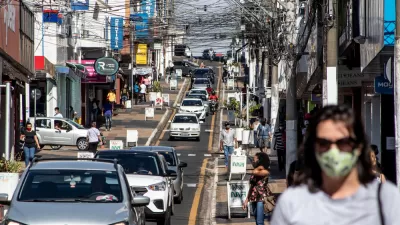Ecologists and planners have been warning that water may be the oil of the 21st century. With oil prices plunging, water is getting more dear in some places. Sao Paulo, Brazil's great megacity and economic heart, is already facing a dire shortage.

Drought isn't the only thing that causes a water shortage. In Sao Paulo, a devastating combination of deforestation, pollution, political corruption, climate change, shoddy infrastructure, and epic rates of urban growth—not to mention a drought—have the city on edge. The city's reservoirs are low, and the city's rivers are too polluted to drink from. City officials are considering rationing—possibly limiting water delivery to two days per week—and in some parts of the city of roughly 20 million, taps are already running dry.
This in a country with one-eighth of the world's freshwater.
"We’re witnessing an unprecedented water crisis in one of the world’s great industrial cities," said Marússia Whately, a water specialist at Instituto Socioambiental, a Brazilian environmental group. "Because of environmental degradation and political cowardice, millions of people in São Paulo are now wondering when the water will run out."
The water utility, Sabesp is building new reservoirs and has plans to draw from nearby rivers. It cannot build fast enough, though, to dampen the ire of many Paulistas. Meanwhile, a prominent Brazilian writer told the New York Times, "The majority doesn’t get indignant with anything,” he said, “as if we’re comfortably strolling toward our own demise."
FULL STORY: Taps Start to Run Dry in Brazil’s Largest City

Maui's Vacation Rental Debate Turns Ugly
Verbal attacks, misinformation campaigns and fistfights plague a high-stakes debate to convert thousands of vacation rentals into long-term housing.

Planetizen Federal Action Tracker
A weekly monitor of how Trump’s orders and actions are impacting planners and planning in America.

In Urban Planning, AI Prompting Could be the New Design Thinking
Creativity has long been key to great urban design. What if we see AI as our new creative partner?

King County Supportive Housing Program Offers Hope for Unhoused Residents
The county is taking a ‘Housing First’ approach that prioritizes getting people into housing, then offering wraparound supportive services.

Researchers Use AI to Get Clearer Picture of US Housing
Analysts are using artificial intelligence to supercharge their research by allowing them to comb through data faster. Though these AI tools can be error prone, they save time and housing researchers are optimistic about the future.

Making Shared Micromobility More Inclusive
Cities and shared mobility system operators can do more to include people with disabilities in planning and operations, per a new report.
Urban Design for Planners 1: Software Tools
This six-course series explores essential urban design concepts using open source software and equips planners with the tools they need to participate fully in the urban design process.
Planning for Universal Design
Learn the tools for implementing Universal Design in planning regulations.
planning NEXT
Appalachian Highlands Housing Partners
Mpact (founded as Rail~Volution)
City of Camden Redevelopment Agency
City of Astoria
City of Portland
City of Laramie




























